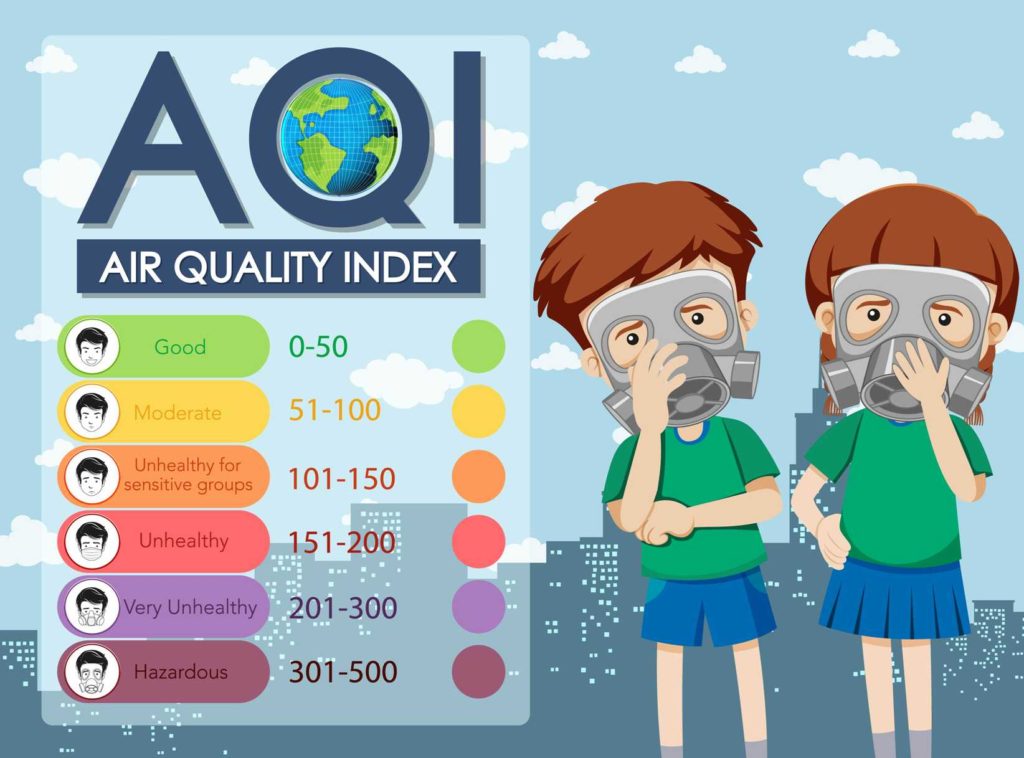As The AQI Level Rises, Here Are The People Who Are Most Vulnerable To Pollution Complications.

The quality of the air we breathe is deteriorating by the day. While pollution and declining air quality levels have now become a year-round problem, the AQI levels in Delhi NCR have been particularly bad this time, with AQI levels in the severe category (AQI>500) and no relief in sight. Water has become toxic as a result of the pollution, with froths visible on the Yamuna’s banks.
Air Pollution Causes Serious Health Problems.
While itchy eyes, a burning sensation in the throat, and coughing are some of the common symptoms associated with polluted air, air pollution is a severe health risk that has long-term implications that impair essential organs. It’s also a condition that can exacerbate other pre-existing conditions and has been proved to reduce life expectancy, according to physicians.
Doctors warn that high levels of pollution pose a significant concern to specific risk groups, making them vulnerable to poor health and hospitalizations. There may also be an increased risk of heart attacks and cardiac diseases as a result of poor air quality and pollution which we inhale.
Not only is it critical to keep ourselves safe and address air pollution at its source, but some patients and populations at risk should exercise particular caution during this time to avoid problems escalating.
If You Are One of the Following, Exercise Extreme Caution and Preventive Care:
Patients with Heart Problems
PM levels in the air, which cause pollution, are a key indicator of poor cardiovascular health. While persons with heart difficulties, or those who have had a past cardiac ailment or stroke, must drastically change their lifestyles and face inflammatory dangers, growing pollution levels can harm heart health even more. PM 2.5 and PM 10 levels have been found to cause high levels of plaque buildup and clogged arteries, putting anybody at risk of heart attacks. Disturbing PM levels in healthy persons can lead to long-term concerns, putting them at risk for ischemic heart disease, stroke, arrhythmias, hypertension, and vascular issues. It also puts men and women at a higher risk of heart disease and heart attacks.
Women Who Are Pregnant
Women who are expecting should use extreme caution while going out or avoid exposure at all costs. Air pollution can harm not just the woman who is carrying the baby (who is already immunocompromised and in danger of infection), but also the unborn child’s health, breathing function, and cognitive health. According to a recent study, pregnant women who are exposed to air pollution have a higher risk of stillbirth and preterm birth.
Covid Sufferers Who Have Recovered
The susceptibility of COVID survivors to polluted air, especially those who suffered from severe COVID, has been highlighted as a key risk this year. While there has been an uptick in the number of persons reporting greater respiratory difficulties and long-term COVID symptoms, COVID survivors with damaged or regaining lung function may be at risk for complications and poor health. Excessive pollution levels may prolong symptoms, exacerbate respiratory symptoms, and cause complications such as lung damage in people with limited or weak lung function. Asthmatics and those who suffer from chronic allergies may experience flare-ups that necessitate immediate medical intervention.
Elderlies
Immune defenses deteriorate rapidly as people get older, and there’s a risk of many comorbidities spreading out. As the body ages and critical functions deteriorate, air pollution can cause not just choking and difficulty breathing, but also diminished lung function. The elderly, especially those over the age of 65, are at a higher risk of having a fever and upper respiratory symptoms as a result of breathing dirty air. If you have lung or cardiovascular difficulties, you must exercise extreme caution and prevent exposure to pollutants, whether indoors or outside.
Children
Studies have shown that younger children are particularly prone to the afflictions of dreadful air pollution and that they may have health difficulties later on. Babies and newborns, in particular, should be exposed to polluted air as little as possible because their lungs are still growing and they are more susceptible to respiratory diseases. Furthermore, because kids inhale more air than adults, they are more susceptible to air pollution-related illnesses and respiratory infections. Because pollution levels can enter the brain, young children may experience mood swings and become irritable.
What Can You Do Right Now If You’re in Danger?
Right now, the best method to limit the risks of air pollution is to avoid exposure to worsening air quality and only go outside if absolutely essential. Fighting pollution necessitates extra caution and checks when you are dealing with additional issues or have significant risk factors. For starters, experts suggest purchasing air purifiers to reduce the risk of indoor air pollution.
Early morning walks or going out should be avoided at all costs, as pollution levels are particularly high at that time. Keep an eye out for symptoms, inhale steam frequently, and use a good quality mask (such as an N95 mask) when you go outside. If you’ve had previous respiratory or chest problems, or if you’ve recently recovered from COVID, don’t dismiss any symptoms and make sure you’re taking the right meds.






